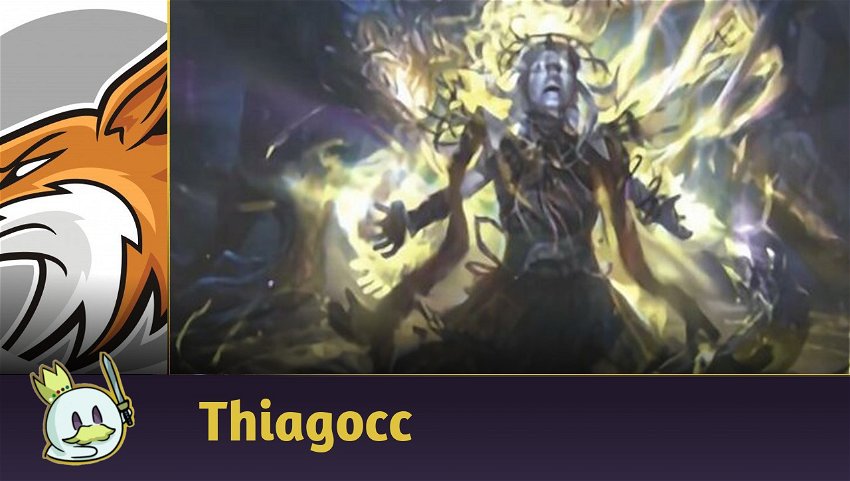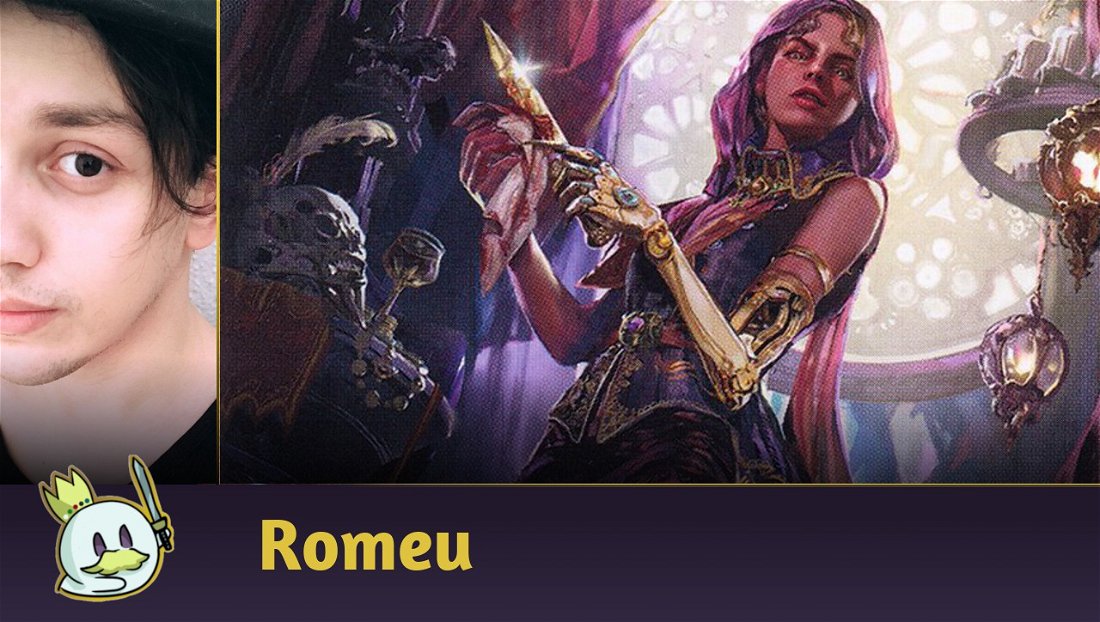My name/nick is Thiagocc I'm 38 years old, I live in Rio Grande do Sul, I'm a competitive MTG player and the captain of the team Mana Fox. I'm delighted with the invitation and opportunity to write articles to Cards Realm!
After a long history of comings and goings on Magic, I'm at the MTG Arena since early 2018. The platform will be the focus of my articles, and you can look forward to content on a variety of topics, from MTGA beginner tips, competitive decks, tournament reporting and limited content.
Considerations for the MCQ
Now let's get to what matters most: my considerations/options for the next Mythic Championship Qualifier which will take place on January 22rd and 23th with Alchemy as its format.
The event will take place on the Arena platform, with unrevealed lists. I prefer the Orzhov Midrange deck, an archetype I've been working with the team for a long time (before Alchemy format even came out!). The friend Felipe Torto was the champion of the first tournament of the Crokeyz Standard piloting this archetype, shortly after Innistrad: Crimsom Vow was released. The deck was an evolution of Mono Black that was playing very well at the time, and we continue to work on it.
But going back to the Alchemy format, the archetype tends to do very well against aggro decks, but the metagame has been bringing Control decks to the tier 1 of the format, like the UW and Esper with Divine Purge, Lier, Disciple of the Drowned and Key to the Archive, which demands a lot of respect.
Despite the excellent winrate with Mono-Green last season, guaranteeing me the position among the top 1200 in the classification and the spot for the event with some ease, the metagame has evolved, and I've been adapting Orzhov's list since the beginning of January for this occasion.
The Decklist
This is a midrange deck with turn 1 plays, generating many resources and resilience and being great against creature decks. Our list tends to play much better post-sideboard against Control, due to the discard spells and the info they give us about the opponent's hand. I have my doubts about the ideal number of Curse of Silence in the deck; I saw lists at Arena Open with 4 copies on maindeck, but I don't particularly think it's essential, so I'm using 2 maindeck copies and one more on the sideboard

What I like most about this deck is the power of the combined 1 and 2 mana cards: making the one-drops Cursebound Witch and Shambling Ghast that generate resources when sacrificed with the turn 2 spells, Deadly Dispute and Rite of Oblivion, puts us in a very favorable position in the game.
The deck's main plan is to make many small permanents, and Wedding Announcement and Sanguine Brushstroke are excellent at this and give you time to respond to major threats on the other side of the board. Citystalker Connoisseur is very welcome on turn 4, and while Legion Angel, Sorin the Mirthless and Lolth, Spider Queen seem to be the protagonists, I say that in this list is the opposite: they are there to enter when the dirty work has already been done.
Mulligan and Keep
So, it's very important to keep hands with turn 1 and 2 plays. Turn 2 has two very distinct lines: removal to hold the opponent's aggression or Deadly Dispute to develop our game. In turn 3 both enchantments tend to be great, but with different functions — Wedding Announcement to hold the blows or generate tokens to hit and Sanguine Brushstroke to develop the board further, have permanents to use sacrifice spells and prepare for future turns. From there, the player's skill will be the main tool to achieve victory.
I consider it a medium difficulty deck to pilot because we have different lines since turn 1. Usually, when the control still has a lot of life, Sorin the Mirthless enters using +1 to already guarantee card advantage.
Flexible Slots
Some flexible slots that, I think, are interesting to note for those who are testing the deck: Curse of Silence can be replaced by Slayer's Bounty because its spellbook has excellent answers against aggro and because it is an artifact for to Deadly Dispute, considering facing less Divine Purge.
Citystalker Connoisseur can be substituted for Edgar, Charmed Groom. Playing with two Sorin the Mirthless and zero Lolth, Spider Queen is also an option, allowing for more safety in recovering life.
Sideboard Guide
It is important to remember that the sideboarding process does not have an exact formula. I consider it very essential to understand how your opponent behaves or how the game unfolds and try to make answers that he does not expect, as well as detecting if there is anything different in their list.
vs. Control Decks
Game 1 is very tight, we can't have reactive turns, so force plays every turn.
Curse of Silence at the beginning should name Vanishing Verse, Divide by Zero, Divine Purge and Key to the Archive, which is also a sure target for Rite of Oblivion.
Play The Meathook Massacre for x=0 at any turn where you have two mana left, as it might make some difference.
Play & Draw
IN:

OUT:

vs. Dragon Decks
I consider it a 60/40 match for us. We need to deal with the accelerators that are Orb of Dragonkind and Fearsome Whelp and try to generate treasures to get The Meathook Massacre to x=4 as fast as possible. If Dragons comes with a lot of removal spells in hand, our win rate increases by a wide margin.
In this matchup, we don't have to worry about creatures that doesn't fly, so don't be afraid to sacrifice your creatures, maybe even to block an Den of the Bugbear. Be cautious not to improve Brittle Blast too much by unloading your hand with creatures that triggers when they die.
Play & Draw
IN:

OUT:

vs. Clerics
This is a deck we need to respond to all creatures from drop 2 onwards, and Pyre of Heroes.
Clerics can generate a "snowball" effect quickly. If you don't have The Meathook Massacre in hand, I advise you to use Curse of Silence to name Inquisitor Captain.
On the Play
IN:

OUT:

On the Draw
IN:

OUT:

Vs. Gruul & Mono-Green
These are extremely aggressive decks. If we have no efficient turn 2 or 3 plays, we are most likely already far behind.
It was because of Gruul that we reduced the number of Vanishing Verse copies (there is an issue in MTG Arena where Verse cannot target Rahilda, Feral Outlaw because the back of this card has no color identity, which is a programming error).
Try to make 1v1 trades as much as possible and don't let Tovolar, Dire Overlord and Halana and Alena, Partners stay on the board for too long.
Play & Draw
IN:

OUT:

vs. Midrange Rakdos
Rakdos Midrange plays with many removals and bets heavily on Den of the Bugbear, as well as Immersturm Predator and Town-Razer Tyrant to end the game, and also cards like Bloodthirsty Adversary and Electrostatic Blast to have recursion.
My plan for winning the game is not to mess with our deck structure too much.
Play
IN:

OUT:

Draw
IN:

OUT:

Conclusion
I've still faced Monoblack sacrifice / Control with some frequency, which is usually a smooth match if we start the game playing the game normally, even more so because we have the recursion of Rite of Oblivion and Legion Angel. Deck variations may appear with Inquisitor Captain and Town-Razer Tyrant, which are in the TOP 5 creatures of the format, so carefully read your opponent's game and plays.
That's all for today, leave your comment and/or question, and I'll be happy to answer.
Don't hesitate to get in touch, the Mana Fox Academy is here for it!
And stay tuned because next week there's a rebalancing announcement for the format, and which cards do you expect to be rebalanced?














— Comentarios 0
, Reacciones 1
Se el primero en comentar